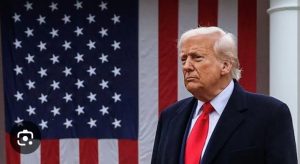

By Dada Ahmed.

(C) ABC News.
When U.S. President Donald Trump, upon assuming office for a second term on Monday, January 20,2025 and unveiled his aggressive new tariff regime,popularly dubbed the “trade war”,many viewed it as a bilateral standoff between Washington and Beijing. However, in today’s interconnected global economy, no nation operates in isolation. Trade disputes between two giants like the U.S. and China inevitably send economic shockwaves across continents,and Nigeria, like many emerging economies, is not immune.
The key question for policymakers and analysts is: How will Trump’s renewed trade war affect Nigeria’s economy, and what strategic responses can help the country navigate the storm and emerge stronger?
First and foremost,it is instructive to look at Trump’s new wave of tariffs which include:Steep duties on Chinese imports (up to 145%),
25% tariffs on automobiles, semiconductors, and pharmaceuticals,Expanded steel and aluminum tariffs,
Duties on goods from the EU, Canada, and Mexico,Executive Order 14245 and imposing tariffs on imports from countries that trade with Venezuela.
The consequences of these tariff measures are the disrupted global supply chains, redefined investment flows, and triggered volatility in commodity markets. Nigeria, heavily reliant on imports and external trade, finds itself navigating a tricky path.
One of the immediate economic effects on Nigeria is the rising cost of imported goods. Nigeria imports a significant volume of electronics, vehicles, industrial machinery, and consumer goods from China. As production costs rise in China due to U.S. tariffs, the cost burden is passed on to global buyers,including Nigerian importers translating into higher prices in Nigerian markets, squeezed household budgets, and added strain on small businesses.
The trade war also casts a long shadow over global oil markets. As trade between the U.S. and China shrinks, global economic growth forecasts are revised downward thereby reducing projected oil demand. For oil-dependent Nigeria, this translates into lower revenues, weaker foreign reserves, and mounting pressure on the naira. The budgetary implications are far-reaching, especially for a country still grappling with infrastructural deficits and socio-economic inequality.
Another indirect yet critical impact lies in foreign direct investment (FDI). Trade tensions have prompted global investors to reassess risk exposure in emerging markets. Nigeria may experience a dual outcome. Cautious investors may pull back, while others could shift focus toward new, less volatile markets. Either way, final experts are concerned that, Nigeria’s capital market stability and currency value risksuncertainty.
Despite the challenges, the trade war presents new opportunities for Nigeria. China, now seeking alternative markets, has deepened economic ties with African countries, Nigeria included. This has led to increased Chinese interest in Nigerian infrastructure, agriculture, and mining. However, these gains come with cautionary notes—especially concerning debt sustainability and trade imbalance.
The current global realignment underscores the urgency for Nigeria to scale up local manufacturing. With Chinese imports becoming costlier, domestic entrepreneurs now have a window to produce locally. Sectors like textiles, furniture, agro-processing, and household goods can thrive if given the right policy support and infrastructure.
To weather the fallout of Trump’s trade war and position itself for long-term stability, economic experts stress the need for Nigeria to pursue a comprehensive economic strategy.
They further urge that neyond rhetoric, agriculture and manufacturing must receive tangible support through credit facilities, tax breaks, and infrastructural development.
They draw the attention of the leadership of the country that the African Continental Free Trade Area (AfCFTA) presents an opportunity to reduce dependency on global powers, adding that Nigeria must actively build intra-African supply chains and export networks.
They argue that since a volatile naira deters investment, it becomes imperative for the Central Bank of Nigeria to pursue a more flexible yet stable forex regime that reflects market realities while encouraging investor confidence.
According to the economic analysts, streamlining bureaucratic processes, digitizing government services, and ensuring regulatory consistency can enhance Nigeria’s appeal to investors and boost industrial growth.
By investing in digital infrastructure, Nigeria can empower startups and tech hubs to lead in fintech, healthtech, and agri-tech—sectors less vulnerable to trade disruptions,they further advise.
Realizing the fact that quality education and skills acquisition are the backbone of innovation and resilience ,it is also being suggested that Nigeria needs a well-trained workforce,an essential element for driving productivity and economic transformation.
Trade and economic policies must be clear, inclusive, and subject to public accountability to foster trust and collective national buy-in to boost good governance in the country.
Trump’s trade war may not have targeted Nigeria, but its consequences are deeply felt.
It is instructive to note that within every disruption lies opportunity.
Therefore If Nigeria can use Trump’s tariff measures as litmus test to leverage regional trade, reform its industrial policies, and invest in people and infrastructure, this will go along way to transform this global setback into a springboard for economic revival of the country.
Political analysts believe that with visionary leadership and collective resolve, Nigeria cannot only withstand the economic tremors from across the Atlantic but rise stronger and more self-reliant in the new global order.
Ahmed is the publisher of The Reporters.
ahmeddada008@gmail.com.


